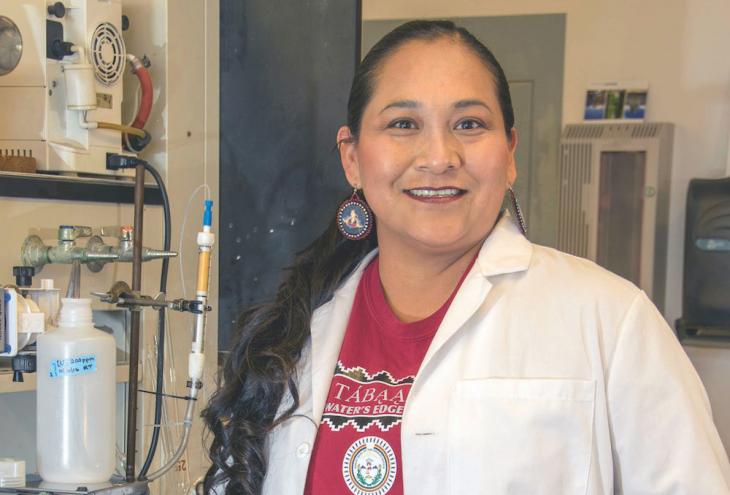Originally from Tółikan (Sweetwater), Ariz., Ranalda Tsosie describes herself as “a proud Diné woman.” She is also the proud mother of seven, an environmental chemist, and a full-time graduate student at the University of Montana, now in her last year in the Interdisciplinary Studies doctoral program with an emphasis in chemistry, geoscience, and environmental studies.
Throughout Tsosie’s educational journey, her traditional upbringing and support from her family have been a source of strength. “My great-grandparents and grandmother raised me to appreciate my culture, language, and traditional way of life,” she says. “My mother recognized my potential from the very beginning and always encouraged me to pursue an advanced degree.” In addition, her path was shaped by her undergraduate experiences at Diné College. “They emphasize the SNBH paradigm (a worldview that guides harmonious living) and how it incorporates Diné philosophies into living a life filled with respect, spirituality, identity, tranquility, balance, and harmony,” she explains. “It also represents four important life lessons: Nitsáhákees (Thinking), Nahat’á (Planning), Iiná (Implementing/Living), and Sihasin (Reflection/Assurance).”
Tsosie says she equates these philosophies with the process of scientific thinking and currently uses them as a basis for the research she is conducting on addressing long-standing water contamination issues within Diné communities. “Growing up on the reservation, and seeing community members slowly fade away into memories, has given me motivation to pursue remedies for ground and surface water contaminations due to historical mining activities,” she says.
Growing up on the reservation, and seeing community members slowly fade away into memories, has given me motivation to pursue remedies for ground and surface water contaminations due to historical mining activities.
When Tsosie had her first child a year after starting at the University of New Mexico, she was faced with a tough decision. “I knew that going to school requires a lot of dedication and would reduce the amount of time I could spend with my family,” she explains. “I knew I couldn’t do that to them, so I stopped and decided to not go anymore. I got a regular job and got used to it.”
Eventually Tsosie realized that she was no longer content to be in customer service. “I still had that passion and that need to do research: to find something new, to be innovative, and to use my curiosity to answer questions,” she recalls. “At some point you realize you are ready. It doesn’t matter if you are the oldest person in that classroom. What matters is that you’re there and dedicated to bringing change to your surroundings — yourself, your family, and especially your community.”
Next to balancing academics and family life, Tsosie found that impostor syndrome was her greatest challenge. “I had to overcome thoughts that I didn’t belong in my graduate program because I wasn’t smart enough,” she says. “Reaching out to my peers in the Native community at the University of Montana and in Missoula, Mont., the AISES Lighting the Pathway to Faculty Careers for Natives in STEM program, and the Sloan Indigenous Graduate Partnership scholars helped me get through and keep going.”
Now coming to the end of her studies, Tsosie has learned that many Native students are like her — they have families and they have persevered. “You can do it,” she says. “I never do any type of graduate work on weekends. I always devote that time to my children. It takes a lot of careful time management, but you can do it!”
Tsosie is hoping to create a career as a professor with a lab group. “I want to have my own science-children!” she says. “I want to foster Native students to get through graduate programs, to be an advocate for them. I’ve been so fortunate to have similar mentors throughout my life. At the same time, I want to be able to focus on research projects that encompass Indigenous methodological approaches and target issues in Indigenous communities.”
She urges aspiring graduate students to write a strong, persuasive personal statement that showcases their strengths and lets admissions staff know who they are. And she is convinced it is all worth it. “It took me two tries and I’m almost there!” Tsosie says. “And I’m happy to say I’m about to be done and that I can foster other Native students who are pursuing their PhD. Try, and if you fail, get up and try again. Because if you don’t try, you will never know the answer.”











